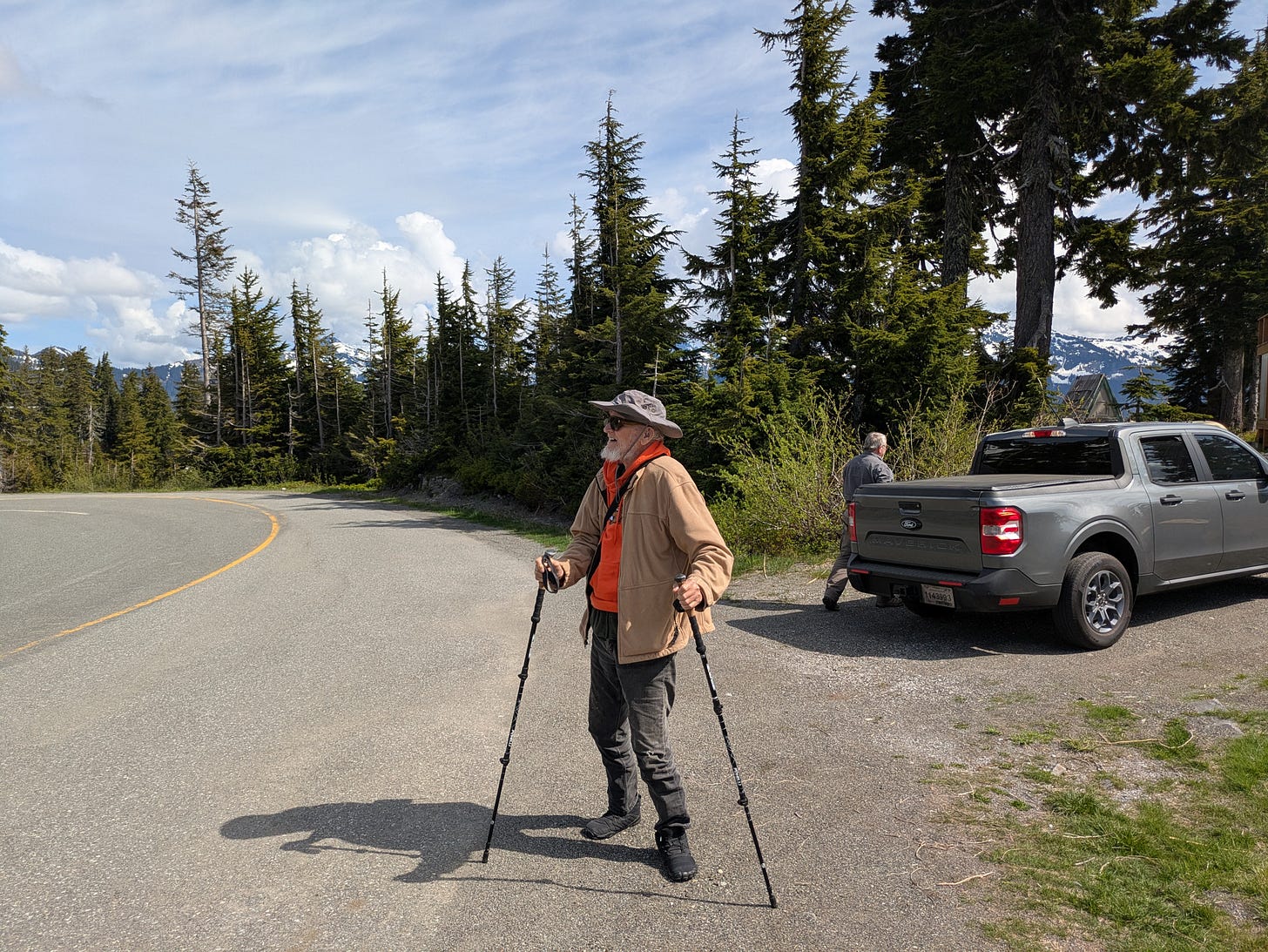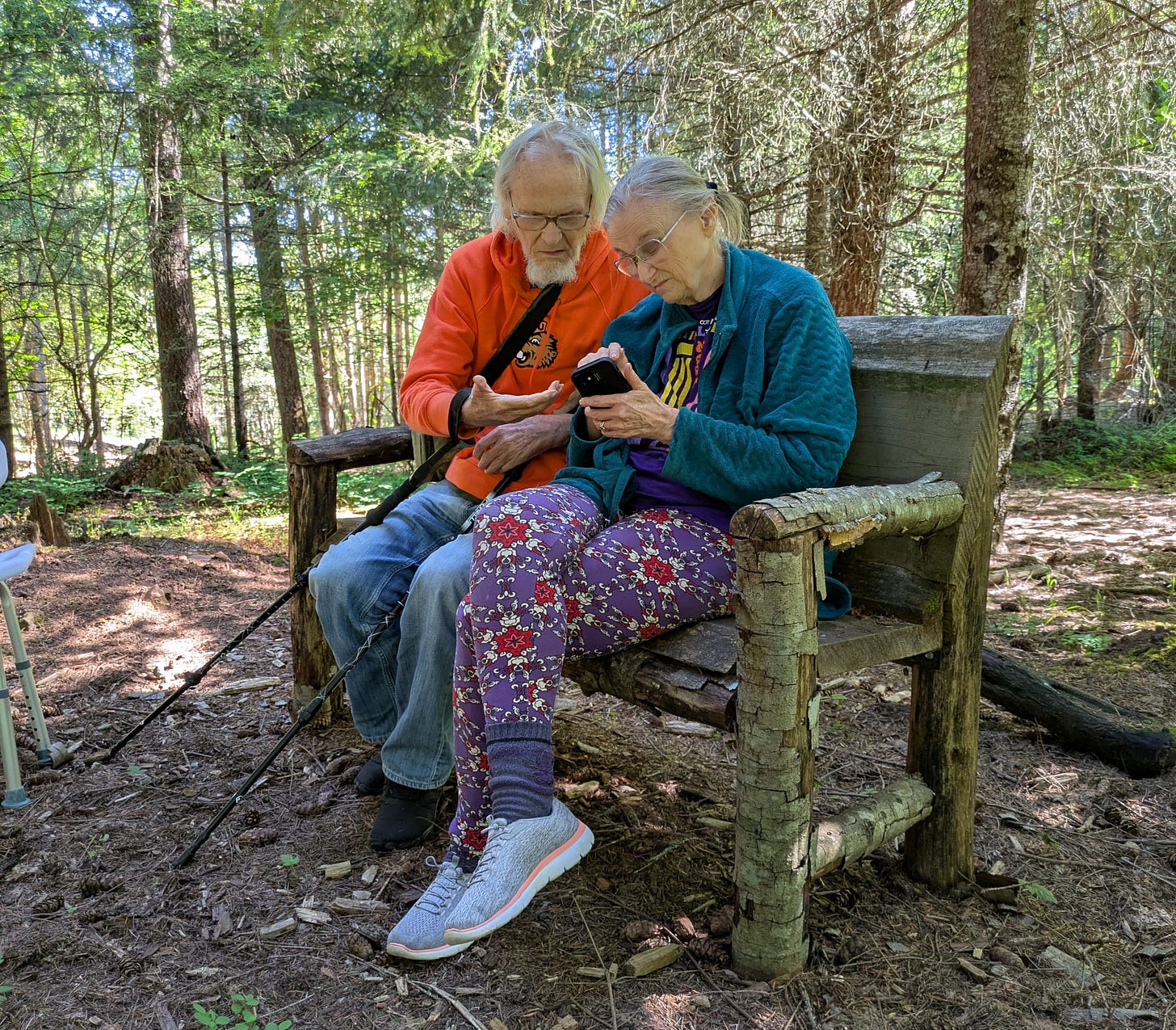A Whackadoodle Story: Two Near-Disasters—and the Training That Averted Them
Two fires—one sparked by oil, the other by carelessness—both stopped by knowledge and training. A reflection on parenting, preparation, and intentional habits.

“By failing to prepare, you are preparing to fail.”
— Benjamin Franklin, Advice to a Young Tradesman, 1748
Some of my readers might be aware that I recently went on a 2½-week trip with my 94-year-old dad. We were visiting my sister at their wonderful place in Oregon.
It was a fun time for all of us. He got a chance to tell some of the stories I’ve heard a dozen times to people who’ve never heard them before. It was fun for me watching him telling the stories. And—believe it or not—he even told a couple I’d never heard in full.
One of those stories came up when we found the house he’d grown up in. A lovely old place in North Portland, sitting on a street with a small hill that led to a four-way intersection. As kids—way back in the 1930s—they didn’t buy toys, they made them. He and his friend had made a kind of go-kart with no brakes (and of course, no helmets). One of their favorite games was to start at the top of that hill, roll down fast, and quickly lean their bodies onto one side, so they could to steer through the corner without crashing. As my dad shared the memory with us, he laughed like the kids he was describing.
Then he pointed across the street, kitty-corner from his house, to another beautiful old home with a screened-in porch. He spoke of a visiting girl who would sometimes sit on its steps watching them—wishing she could join in the fun. With a twinkle in his eye, he added: “Turned out, years later in college, I finally met that little girl. I fell in love, and for some reason that I will never understand, she accept me in marriage. We had five children together, and shared seventy-two years of friendship.”
I started to tear up, seeing the place where the story had been lived.
My mother passed away several years ago. We still keep her ashes in an urn on our bookcase because it was always their wish that when both had passed, their ashes would be mingled. Half buried in Oregon’s family plot. The other half sprinkled in Kailua Bay, off Sand Island—where my brother’s ashes were spread. A final act of devotion. A proclamation that their love will last forever.
Two good stories. I was glad to hear them again.
However, neither of those stories are the ones I came to tell.
Let’s call this first one: The Fire That Almost Happened.
My father was a trained forester. He fought fires all his adult life and trained others to fight them—especially wildfires. Because of that, we often lived in forestry housing, way out in the boonies, with no central heat. The main heat source of one particular house was a standing oil-burning stove located in the main living room. A stovepipe connected the stove to the room’s chimney.
Now—and I am semi-quoting my Dad here because he wants to make sure I get this right—one night, the stove went out and needed lighting. We kids were already in bed. I must’ve been about six months old at the time—based on where we lived—so I wasn’t walking or talking. My older siblings were all asleep in their rooms.
So, my father goes to relight the heater before retiring for the night. He notices a thick layer of oil spread across the base of the fire box. Looking back, he says that he probably should have wiped up some of that oil before lighting it, but he knew that the oil would eventually burn off, so he decided it would be safe to light it. Only after the fire was lit did he notice that the pipe to the chimney was suddenly glowing red hot. In a flash, he realized his mistake, and screams to my mom, “Fire! Get the kids out!” As he was yelling, fire began pouring out of the fire box, threatening to spread.
And what did he do next?
He went for a fire extinguisher to beat back the flames, and keep them contained within the firebox. He didn’t call 911. Heck, they didn’t even have 911 back then, and my parents didn’t have a phone in the house anyway. They used to drive to a friend’s house if they needed one. So my father’s instant reaction? Save the kids and fight the fire.
My mom’s instinct was different—but just as powerful. Her instinct was to save the kids and keep her husband from dying while fighting that a fire. She screams at him: “Leave it! Help me with the kids!”
So they both go into motion.
He started handing kids out the bedroom window to her—one by one. She was out in the snow, possibly barefoot, catching them. She ran each child to the car, buckled them in, and dashed back to the house for the next one.
But what she didn’t know was this: in between handing out kids, my dad kept returning to the stove, knocking back the fire, one blast at a time. Then back to the window. Next kid. Back to the fire. Back to the window. He never stopped.
Eventually, all the children were in the car, and my mother was shouting: “Leave it! Get out! Let it burn!”
But he wouldn’t. He kept at it. He knew from his training that if he could keep knocking back that fire until the excess oil burned off, it would eventually burn down to normal. So he ignored my mother’s pleading, made sure he had an escape route at his back, and kept fighting.
In the end, the fire did burn down, and all it cost him was a singed eyebrow and a semi-ruined woolen jacket. That night, all of us slept in our own beds.
A wild night, yes. But also a case study in instinct and training.
His story got me thinking: Why is it that some people run towards fire, while others run away?
The answer, I believe, is habit. Training. That’s why we train our firefighters. That’s why we train soldiers. So they don’t freeze when the moment comes. They don’t have to think. They just act—on practiced instinct. Intentional habits.
And this wasn’t the only time I saw that kind of training in action.
Years later, my brother—who was raised by that same father—showed the same instincts. We used to run fire drills at home, and he always did them right. While the rest of us would forget everything, he’d put his hand against the door to check for heat, crawl low to avoid smoke, and head to our designated meeting spot. He even crawled to safety once when the fire alarm went off by accident. Me? I almost always slept through them.
Fast-forward twenty years: we’re adults, sharing an apartment in Portland. I wake up to the smell of smoke. He’s pounding on my door: “Lynn! Lynn! There’s a fire next door—get out!”
I grab my ferret (yes, I had a ferret), stick him in his basket, and flee the building.
But not my brother.
My brother finds a hose, wets a blanket, throws it over his head, and enters the burning apartment.
He checks to make sure nobody’s inside. Then he starts fighting the fire. He doesn’t even wait for the fire department. By the time they arrive, he’s soaked, covered in soot, but calm. They tell us if he hadn’t acted, that fire—started by a pillow on a heater—might have done real damage to the whole building.
All I could think was: my brother was a hero because of his training.
Which brings me to the point.
It’s not just fires.
We all have moments—hard moments, awkward moments, emotionally charged moments—where we need good habits to kick in. And if we don’t have those habits, we fall back on reflexes we might regret.
Take a friend of mine. She has a tendency to tell mean-spirited stories behind people’s backs. Not malicious exactly—just the kind of “funny” that leaves you with a bad taste. I mean, these are the kinds of stories you would never share if the person in question was listening. Unfortunately, my reflex has always been to laugh awkwardly and say nothing.
But I’ve thought about it. I’ve rehearsed how I want to respond next time.
I think I’ll start with a quiet laugh, followed by: “Your stories always make me wonder what you say about me behind my back.”
Nothing too big. Just enough to signal: I’m on to you. I’ve noticed. I don’t think it’s funny. And just maybe it’ll make her think twice before doing it around me again.
That’s what I mean when I say: practice matters.
We can’t always control what happens. But we can rehearse how we want to show up.
We can train our habits so that—when the heat comes—we respond in a way we can be proud of.
So here’s some food for thought: Take some time this week to think about situations that you might need to practice, and then take some time practicing them.
Until next time, happy navigating.
—Miss Lynn, Et al.



